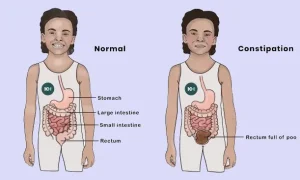Overview
Diagnosis
Your child’s doctor will:
-
Gather a complete medical history, including questions about past illnesses, diet, and physical activity patterns.
-
Conduct a physical exam, which may involve placing a gloved finger into your child’s anus to check for abnormalities or the presence of impacted stool. Stool found in the rectum may be tested for blood.
More-extensive testing is usually needed only for severe constipation. These may include:
-
Abdominal X-ray: Helps detect blockages in the abdomen.
-
Anorectal manometry or motility test: A thin tube is placed in the rectum to measure muscle coordination during bowel movements.
-
Barium enema X-ray: Uses contrast dye to clearly show the rectum, colon, and sometimes the small intestine on an X-ray.
-
Rectal biopsy: A small tissue sample is taken from the rectum to check if nerve cells are normal.
-
Transit or marker study: Your child swallows a capsule with markers visible on X-rays taken over several days to track how stool moves through the intestines.
-
Blood tests: Occasionally used to check for thyroid or other conditions.
Treatment
Depending on your child’s needs, the doctor may recommend:
-
Over-the-counter fiber supplements or stool softeners such as Metamucil or Citrucel. These work best when your child drinks enough water—about one liter per day. Always confirm the correct dose with your doctor.
-
Glycerin suppositories to soften stool for children who cannot swallow pills.
-
Laxatives or enemas to clear severe blockages, such as polyethylene glycol (MiraLax) or mineral oil. These should only be used with a doctor’s approval.
-
Hospital enema in severe cases requiring professional disimpaction.
Alternative Medicine
In addition to diet and routine changes, some alternative therapies may help:
-
Massage of the abdomen to relax intestinal muscles and promote bowel activity.
-
Acupuncture, which may reduce constipation-related abdominal pain.
Preparing for Your Appointment
If your child’s constipation lasts more than two weeks, visit your child’s doctor. You may be referred to a gastroenterologist. To make the most of your visit, prepare by:
-
Noting any pre-appointment instructions such as diet restrictions.
-
Recording your child’s symptoms, their start date, and details about stool frequency and appearance.
-
Listing major life changes, stressors, or new routines.
-
Bringing a list of all medications, supplements, and treatments you’ve already tried.
-
Preparing questions for the doctor.
Questions to Ask the Doctor
-
What is the most likely cause of my child’s constipation?
-
What tests are needed?
-
How long might the condition last?
-
What treatments or diet changes do you recommend?
-
Should we see a specialist?
-
Are there non-medication options?
-
What reliable resources or websites do you recommend?
What to Expect from the Doctor
Your child’s doctor may ask questions such as:
-
When did constipation begin?
-
Are symptoms continuous or occasional?
-
How severe are they?
-
What improves or worsens symptoms?
-
Is there blood in the stool or toilet water?
-
Does your child soil underwear or strain to pass stool?
-
Is there a family history of digestive issues?
-
Has your child started new medication recently?
-
How was your child’s toilet training experience?
What You Can Do in the Meantime
You can help relieve constipation before your appointment by:
-
Giving your child prune juice, mixed with another juice if needed.
-
Reducing constipating foods such as milk and cheese.
-
Encouraging regular physical activity like walking or running.
-
Taking a break from toilet training if it seems to be causing stress or worsening symptoms.
Advertisement

